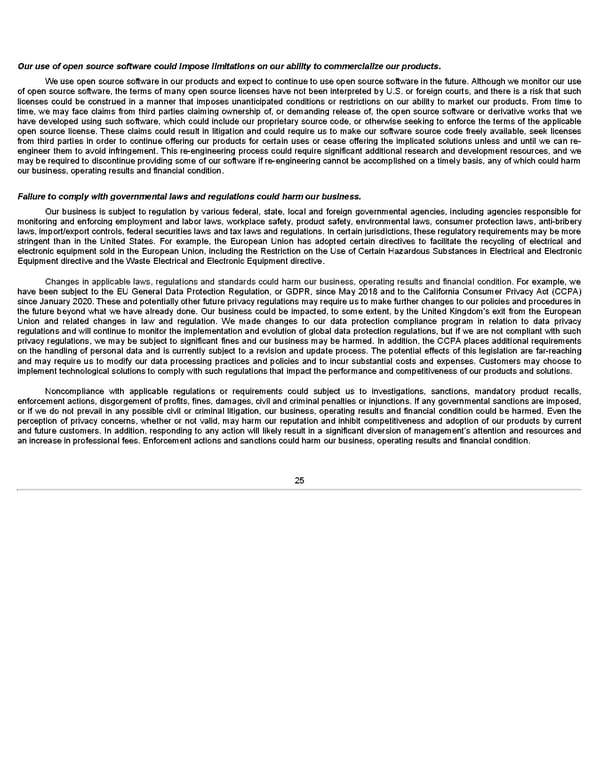Our use of open source software could impose limitations on our ability to commercialize our products. We use open source software in our products and expect to continue to use open source software in the future. Although we monitor our use of open source software, the terms of many open source licenses have not been interpreted by U.S. or foreign courts, and there is a risk that such licenses could be construed in a manner that imposes unanticipated conditions or restrictions on our ability to market our products. From time to time, we may face claims from third parties claiming ownership of, or demanding release of, the open source software or derivative works that we have developed using such software, which could include our proprietary source code, or otherwise seeking to enforce the terms of the applicable open source license. These claims could result in litigation and could require us to make our software source code freely available, seek licenses from third parties in order to continue offering our products for certain uses or cease offering the implicated solutions unless and until we can re- engineer them to avoid infringement. This re-engineering process could require significant additional research and development resources, and we may be required to discontinue providing some of our software if re-engineering cannot be accomplished on a timely basis, any of which could harm our business, operating results and financial condition. Failure to comply with governmental laws and regulations could harm our business. Our business is subject to regulation by various federal, state, local and foreign governmental agencies, including agencies responsible for monitoring and enforcing employment and labor laws, workplace safety, product safety, environmental laws, consumer protection laws, anti-bribery laws, import/export controls, federal securities laws and tax laws and regulations. In certain jurisdictions, these regulatory requirements may be more stringent than in the United States. For example, the European Union has adopted certain directives to facilitate the recycling of electrical and electronic equipment sold in the European Union, including the Restriction on the Use of Certain Hazardous Substances in Electrical and Electronic Equipment directive and the Waste Electrical and Electronic Equipment directive. Changes in applicable laws, regulations and standards could harm our business, operating results and financial condition. For example, we have been subject to the EU General Data Protection Regulation, or GDPR, since May 2018 and to the California Consumer Privacy Act (CCPA) since January 2020. These and potentially other future privacy regulations may require us to make further changes to our policies and procedures in the future beyond what we have already done. Our business could be impacted, to some extent, by the United Kingdom's exit from the European Union and related changes in law and regulation. We made changes to our data protection compliance program in relation to data privacy regulations and will continue to monitor the implementation and evolution of global data protection regulations, but if we are not compliant with such privacy regulations, we may be subject to significant fines and our business may be harmed. In addition, the CCPA places additional requirements on the handling of personal data and is currently subject to a revision and update process. The potential effects of this legislation are far-reaching and may require us to modify our data processing practices and policies and to incur substantial costs and expenses. Customers may choose to implement technological solutions to comply with such regulations that impact the performance and competitiveness of our products and solutions. Noncompliance with applicable regulations or requirements could subject us to investigations, sanctions, mandatory product recalls, enforcement actions, disgorgement of profits, fines, damages, civil and criminal penalties or injunctions. If any governmental sanctions are imposed, or if we do not prevail in any possible civil or criminal litigation, our business, operating results and financial condition could be harmed. Even the perception of privacy concerns, whether or not valid, may harm our reputation and inhibit competitiveness and adoption of our products by current and future customers. In addition, responding to any action will likely result in a significant diversion of management’s attention and resources and an increase in professional fees. Enforcement actions and sanctions could harm our business, operating results and financial condition. 25
 Annua lReport Page 24 Page 26
Annua lReport Page 24 Page 26